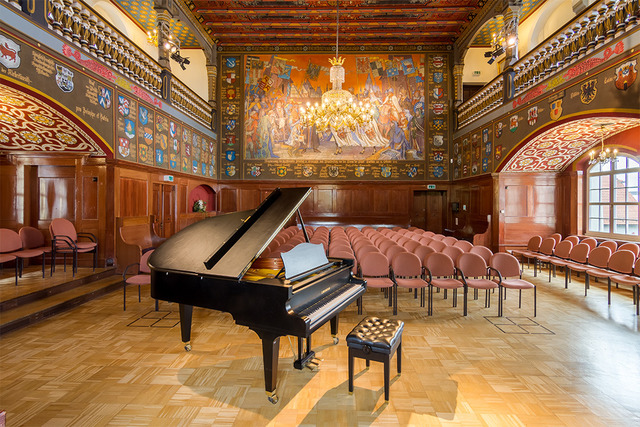About the production
Start
7:30 p.m.
End
10 p.m.
Our series presenting all of Beethoven’s string quartets in the order of their composition continues with the three Opus 59 works, known as the Razumovsky Quartets, because they were commissioned by the diplomat Count Andrey Razumovsky, who was an ambassador at the royal court in Vienna.
These three string quartets, the middle one in a minor key, the other two in major, were composed in 1806 – an extremely productive period for Beethoven and a time of political upheaval. After Napoleon crowned himself Emperor in 1804, Beethoven scratched out his dedication of his »Eroica« symphony to Napoleon and, even though he was still financially dependent on the aristocracy, began to seek a new audience among the bourgeoisie. He found inspiration in Ignaz Schuppanzigh and his ensemble of the same name, and this group began to premiere many of the composer’s quartets. From this time on, the complexity and difficulty of Beethoven’s music challenged musicians and audiences alike.
The String Quartet No. 7 in F major is often referred to as the »Eroica” of string quartets«, particularly because of its first movement: the cello sings a theme that is taken up by the other instruments and richly varied in the development section. The second movement, a Scherzo, also begins with the cello, which is then answered by the violin – the minor theme of the third movement can already be heard here, anticipating the increasing interconnection of the movements. The melancholy Adagio of the third movement moves from a violin cadenza and a trill directly into a dance-like Allegro-Rondo in the cello that is titled »Thème Russe« and based on a Russian folk song. Just as the movement seems to be coming to a tender conclusion, nine laughing Presto measures gallop past at the end.
String Quartet No. 8 is in the key of E minor, which Beethoven only employed in this piece and the Piano Sonata No. 27 as well as in one movement of the ninth piano sonata and the Andante of his fourth piano concerto. Following two chordal attacks and a general pause, the main theme appears, made up of a triadic motif and descending sixteenth notes. In the course of the first movement, the two chordal attacks appear 26 times and the general pause 19 times, creating an atmosphere of hesitance and aimlessness. Another interesting rhythmic aspect can be found in the third movement, whose dance-like theme begins with syncopations and is based on the Russian folk song »Sláva Bogu na nebe«. As the movement unfolds, the melody is contrapuntally elaborated. The Finale-Rondo of the fourth movement begins with a C-major theme that only gradually finds its way back to the tonic key of E minor. The C-major theme points harmonically to the next quartet.
The first movement of the Quartet No. 9 in C major begins slowly, with several unresolved chords, before a solo violin cadenza leads to the lively main theme. The lyrical and melancholy Adagio with cello pizzicato notes in A minor can be seen as a critical view toward an uncertain future. The third movement is an ironic treatment of courtly dances of the past, while the turbulent final movement brings this quartet and the entire Razumovsky group to a rousing conclusion.
Quatuor Danel
Das belgische Quatuor Danel wurde 1991 gegründet und ist heute auf allen großen Konzertbühnen der Welt zuhause. In seiner jetzigen Besetzung mit Marc Danel (Violine), Gilles Millet (Violine), Vlad Bogdanas (Bratsche) und Yovan Markovitch (Cello) spielt es seit 2014. Viele Aufnahmen seiner umfangreichen Diskographie wurden mit internationalen Preisen ausgezeichnet.
Das Quartett wird gerühmt für seine Interpretationen ganzer Streichquartett-Œuvres. Dabei spielen russische Komponisten wie Schostakowitsch eine besondere Rolle. Es ist zudem das erste Ensemble, das sämtliche 17 Quartette von Mieczysław Weinberg eingespielt und als gesamten Zyklus in Manchester und Utrecht live aufgeführt hat. Als Uraufführungsquartett arbeitet es darüber hinaus regelmäßig mit zeitgenössischen Komponisten zusammen, darunter Wolfgang Rihm, Helmut Lachenmann, Sofia Gubaidulina, Jörg Widmann und Bruno Mantovani. Zu seinen musikalischen Partnern gehören Künstler wie Leif Ove Andsnes, Jean-Efflam Bavouzet, Alexander Melnikov, Adrien La Marca, Clemens Hagen oder das Borodin Quartet. Das Quatuor Danel ist Quartet in residence an der University of Manchester.
Artists
violin Marc Danel
violin Gilles Millet
viola Vlad Bogdanas
violoncello Yovan Markovitch
Location
Location Wappensaal im Schloss zu Lübben / Lubin
Address Ernst-von-Houwald-Damm 14, 15907 Lübben (Spreewald) / Lubin


